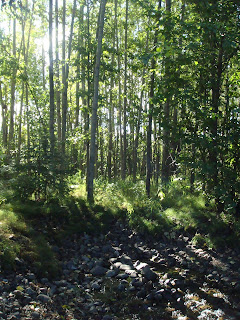“All endings are beginnings. You just don’t know it at the time.” This is one of Mitch Abrom’s central themes voiced through Ellen Burstyn’s characters in the movies, THE FIVE PEOPLE YOU MEET IN HEAVEN and ONE MORE DAY. Recall for a moment the time-lines we studied in school depicting the end of one great era in history, anthropology, science, or art and how clearly new periods and discoveries, even whole new civilizations and revolutionary ways of understanding the world inevitably flowed from old endings.
(This is an image taken from our glacier landing in Alaska this summer. Above Dante and Beatrice gaze upon the highest Heaven, from Gustave Doré’s illustrations, Divine Comedy, Paradiso Canto 28, lines 16–39)
Near the end of high school or college, many students attend a KAIROS retreat. Artists and people on individual quests may also participate formally or informally in a Kairos experience. A quick Wikipedia explanation goes like this: “Kairos meaning airos (καιρός) is an ancient Greek word meaning the right or opportune moment (the supreme moment). The ancient Greeks had two words for time, Chronos and Kairos….” For the purposes of this entry, we’ll refer to the latter, “…signifying a time in between, a moment of undetermined period of time in which something special happens. What the special something is depends on who is using the word. While chronos is quantitative, Kairos has a qualitative nature.”
(Homer, Alaska)
A central piece of the Kairos retreat consists of contemplating the stages and significant events in our lives, even key choices we’ve made, so that we can visualize and actually draw our individual “life map.” The exercise helps us to see how important points in our personal history lead to new developmental stages and discoveries. Through this process, as we prepare to embark on new aspects of our individual journey, we are able to gain great insight and wisdom from the choices and patterns of what has been, wisdom and insight that will serve us for the forks in the road and new choices that will lie ahead. We see very clearly that all personal endings, even those that seem insignificant, depending on the choices we make, may indeed be watershed moments in our lives, to bring forth infinite possibilities for healthful beginnings.
(In each heart there is a landscape not everyone can see, where we are searching for the One who is searching for you and me. Except where noted, all images at the blog: Copyright D.M. Solis)
Even when not on retreat, as we reflect on our lives, we discover that deeply difficult experiences, whether loss of a job, the end of a relationship, or the death of a beloved, can signify a transition to a positive beginning we may or may not be able to see at the time--because so much change is involved at so many levels, because change is complicated, and because even beneficial change can be very difficult for us. In due time, however, we may discover how this time of Kairos, when one phase is or must be ending, is a most valuable “time between” some amazing new phases or aspects of our lives. We may also recognize the many graces being poured out for us during a time of Kairos, even in deep personal struggle or great grief.
One grace of this time is the invaluable sense of how much we can survive, because we do survive. We learn about strengths we have that we didn’t know we possessed. But there’s so much more. One of the most critical graces we find through great loss and deep grief, through the important endings in our lives, is the way tragedy opens us.
We experience with our senses, with our minds and hearts, as we may never have experienced or perhaps don’t remember experiencing before—not since the openness of childhood perhaps. We may discover a new spirituality within our own belief system, or in nature, even in coincidence and serendipity, because of the synchronicity that seems to flow when we are raw, open, and critically aware of deep feelings, for example, of love, pain, compassion, even the paradox of joy-within-sadness as we never have quite experienced before. Yes, I said, “JOY.” Because even as we grieve, there is the added grace of the strange, healing relief we can experience of joy in the simplest things, a sparrow splashing in a muddy puddle of water, our family and friends gathered around us, a seat at a table where we did not before feel this completely welcome for who we truly are.
This rare wonderful time of openness may pass, as we heal, as we move on, as one distraction of life and another take us forward, through the passage of time, causing the rawness to diminish and eventually to fade. A key for all of us during the special time of Kairos--of “man-ing or woman-ing up” and feeling our pain, facing it and eventually transitioning, learning to let go of the pain, so learning to live again--a key is to keep sacred the openness we learn, so that we can continue as much as possible to experience things like nature, art, the faces of our beloveds, the touch of their hands, the embrace of the world, from the place where great grace and the purification of suffering have rendered our hearts open, our minds clear and honest, and our souls more alive than they might have been if we had never voyaged so deeply.
My prayer for every reader and for myself, as we continue through the stages of our various transitions, is that we may all continue to learn while embracing, acknowledging and dealing with the beauty of endings which can lead to wondrous beginnings in the increasingly fabulous and amazing maps of our lives.






